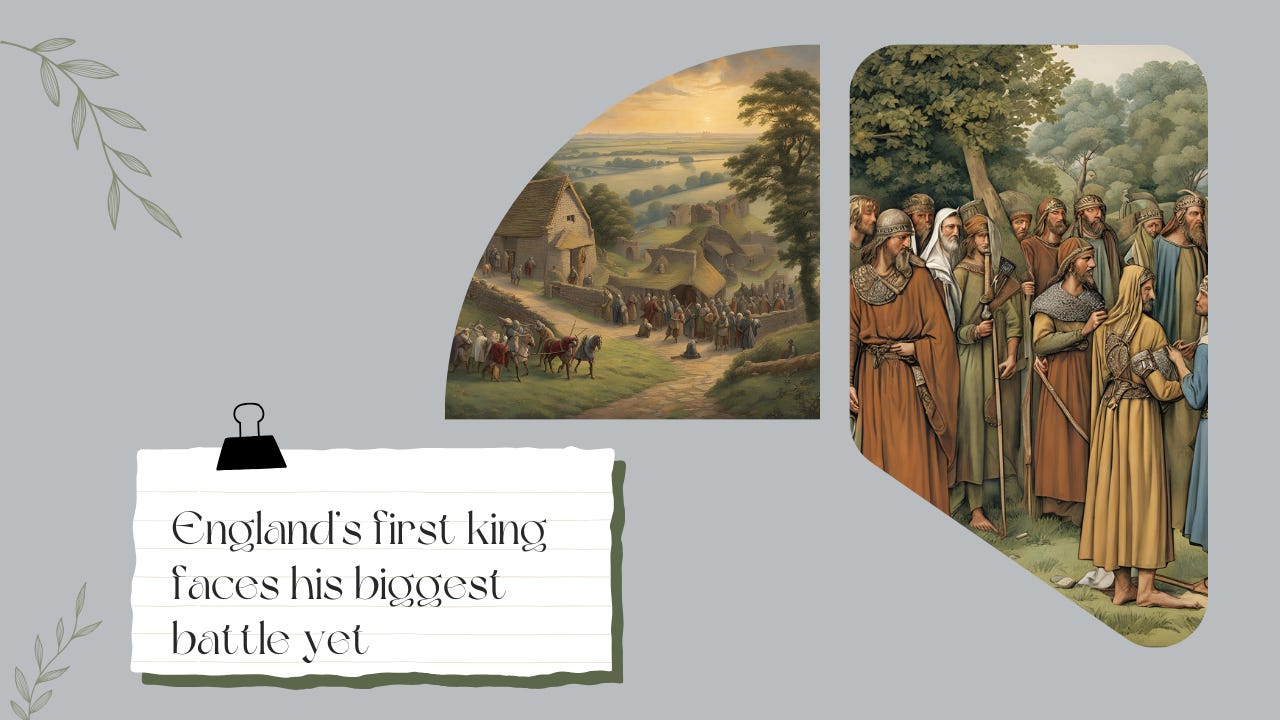England's first king faces his biggest battle yet
'The Battle of Brunanburh' and the emergence of nationalism in the poetry of the West Saxons
A series sharing Anglo-Saxon poetry, with the hope of revealing the untold lives and tales within them: the shared experiences we have with their emotions as they journeyed through lives over a thousand years ago.
Click here to check out previous posts in this series!
Heroic battle poetry was a big thing in Anglo-Saxon England. Maybe the idea of ‘battle poetry’ seems like something of an oxymoron: how can something so painful and something so beautiful go together?
For the Anglo-Saxons, poetry was the perfect medium for remembering and sharing epic victories, as well as providing a focal point, holding space, for lament and grief at great loss.
The verses chanted around hearths and in great halls provided entertainment for a deeply martial culture, somewhat like songs, concerts or musicals today. They commemorated the deeds of mighty warriors, inspiring others to take up their swords in the relentless pursuit of power and dynastic security.
King Athelstan, the lord of warriors, Patron of heroes, and his brother too, Prince Edmund, won themselves eternal glory In battle with the edges of their swords Round Brunanburh; they broke the wall of shields, The sons of Edward, with their well-forged blades, Slashed at the linden-shields; such was their nature From boyhood that in battle they had often Fought for their land, its treasures and its homes, Against all enemies.
The Battle of Brunanburh1 describes a major clash between a combined force of Norsemen (under Anlaf, based in modern-day Dublin) and Scots (under Constantine), and another combined force of Mercians and West Saxons who fought for the West Saxon king, Æthelstan, grandson of Alfred the Great and arguably the first king of a united England.2 This locates the battle in the second quarter of the tenth century, during that long tussle between the English and the Vikings.3
According to the poem itself, the battle at Brunanburh was the greatest that had been fought in Britain since the fifth century A.D.:
There has not on this island Been ever yet a greater number slain, Killed by the edges of the sword before This time … after Angles came And Saxons to this country.
Despite the large death toll and significance of the battle, however, its precise location remains elusive. Some have argued that it took place near modern-day Liverpool, others that it was on the opposite coast, towards the east. Anglo-Saxon battles unfortunately left behind fewer material remnants than those in later centuries and place names can be very different to their modern equivalents; it is possible that we will never truly know the true theatre in which this battle took place.
Their foes fell dead, The Scottish soldiers and the pirate host Were doomed to perish ... The Mercians refused Hard battle-play to none among the fighters Who came with Anlaf over rolling seas, Bringing invasion to this land by ship, Destined to die in battle.
The poem was written when the West Saxon court was obsessed with manufacturing the sense that their ruling dynasty were the rightful rulers of a united England.4 Texts preserve their assertions that they deserved to be supreme rulers, and I think the language used of their opponents in The Battle of Brunanburh captures this too. Their foes are described as ‘doomed to perish’ and ‘destined to die in battle’: it was fate, God’s plan, that Æthelstan and Edmund would be victorious.
Also the wise old Constantinus came, The veteran, to his northern native land By flight; he had no reason to exult In that encounter, for he lost there friends And was deprived of kinsmen in the strife Upon that battle field, and left his son Destroyed by wounds on that grim place of slaughter, The young man in the fight. The grey-haired man Had little cause to boast about that battle. The sly old soldier, any more than Anlaf; They could not with their remnant laugh and claim That they were better in their warlike deeds.
The poem also does a wonderful job of contrasting the two sides in the battle. Constantine and Anlaf ‘had no reason to exult … little cause to boast’, whereas the reason the poem was written was to laud Æthelstan and Edmund’s victory. These poems would be shared across lordly households as performers travelled to share news in poetic form. The West Saxon’s God-ordained victory would have spread throughout the island, along with the notion that they were victorious because they were rightful rulers.
The Norsemen left them in their well-nailed ships, The sad survivors of the darts, on Dingesmere Over the deep sea they went to Dublin, To Ireland they returned with shameful hearts. The brothers [Athelstan and Edmund] also both went home together, The king and prince returned to their own country, The land of Wessex, triumphing in war.
Here the warriors’ respective returns are held up against each other: one as ‘sad survivors’ with ‘shameful hearts’, the other ‘triumphing in war’. If there was any doubt remaining over Æthelberht’s military prowess (an essential quality for medieval kingship), the poet drives his point home in these closing lines of the poem.
What are your thoughts on the concept of battle poetry? Did any words, phrases, or ideas in this ancient poem capture your heart or imagination? Comment below to share your thoughts with out community.
Are you new here? Check out my welcome post below to find out more about me and what you can expect here on Telling Their Tales.
Telling Their Tales - What's it all about?
Hi there, I’m Holly. Welcome! I’m currently a full-time stay-at-home-mum, having welcomed our little one in May 2023, and I pursue my love for reading and writing history in the edges of motherhood (read: during nap times). Motherhood has changed me entirely in more ways than I have words to describe here, but one of the best is that I’ve been able to sp…
Unless stated otherwise, all poetry excerpts are taken from R. Hamer (ed. & tr.), 2015. A Choice of Anglo-Saxon Verse (London: Faber & Faber Ltd.), p. 41, 43, & 45.
Hotly debated, but a case can be made for him to hold this accolade.
The backgrounds of the respective parties is far more complex than ‘English and Viking’, but this is a helpful short-hand for this limited article. I do hope you’ll forgive me!
This had been begun by Alfred the Great, whose Anglo-Saxon Chronicle is a masterpiece of nationalist propaganda (if the word ‘nationalist’ can be used of this age before the concept of the ‘nation’). Bede, with his history of ‘the English people’ was a much earlier example of this kind of thought, but his work was much more closely tied to the idea of a unified church of the English, ecclesiastical rule over the peoples of the island, than that of a unified kingdom under one family’s leadership.







Enjoyed reading this, Holly. I included Æthelstan's (fake) grave at Malmesbury in one of my novels, but never read any of the battle poetry before. Would be great find the true battlefield one day. Look forward to checking out your earlier posts!